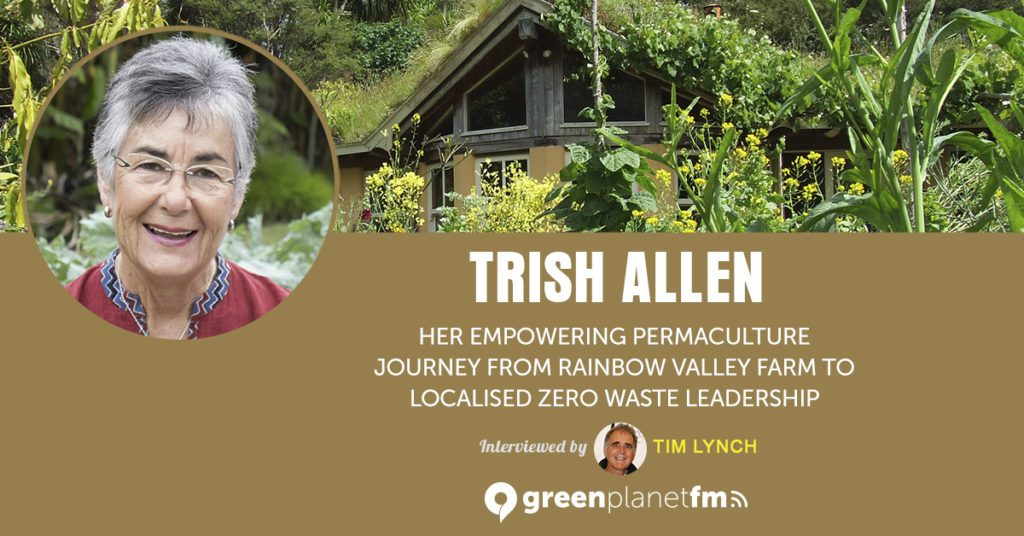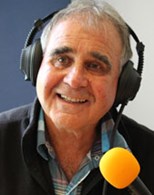
Trish tells of the story of Rainbow Valley Farm that she and her late husband Joe Polaischer, manifested together. It was their inspiration and creative
choice to find solutions. This whole process allowed her to experience Permaculture in action and especially how it empowered both her and Joe, to
action.
And this started a 25 year long adventure with her and Joe together. By finding a piece of run down farmland in Matakana they turned it into an oasis.
It had previously a tough history and because it was not expensive they could afford it. The early European farmers had cut down all the forest of
the step hills that was once rainforest land - the soils were fragile so with what little topsoil cover that was left, was washed away into the stream
and then out into the harbour.
What was left of the land was very poor - and infested with pests, kikuyu (Kenyan grass) and eroded. But, it was an amazing opportunity to restore the
land and bring back it back to fertility.
Within 25 years it became a permaculture paradise - with a low ecological footprint - growing their own organic food - getting the microorganisms back
into the soil - and it was basically just them, however as time went by more people became interested and they received more and more visitors.
Then education started, the local school classes used to come and visit. Then universities and Unitech. They then built a non toxic mud back house with
earth roof. Attracting the interest of architects and designers. This led to all types of workshops being run.
From mud brick making, composting toilets, mud brick making, shingles and shakes - composting - worm farming - then, introduction to Permaculture courses
and Permaculture design courses 2 week intensive design courses. It just continued to grow.
In 1991 their first course was, how to reduce your household rubbish 'a zero waste workshop' and Trish is still doing 'zero waste' 31 years later They
wasted nothing on the farm.
Though she said their biggest job was to grow microorganisms in the soil.- They also planted 800 fruit and nut trees, and were involved in starting the
Farmers Market in Matakana Village. Selling fruit, veggies, plants, flowers, plus eggs. They also had bees and used to sell honey.
Joe wanted to grow rice too and ended up growing about 50 kilos per annum. Plus mushrooms in a shady moist environment - he inoculated logs with shiitake
mushroom spores and had a large production of shitaki, namiko and also oyster mushrooms.
With fresh milk from the house cow - came butter, yogurt and cheese. Also farmed were sheep and kuni kuni pigs and all numbers of poultry, chickens, ducks,
guinea fowl, pigeons, turkeys - it was a real old McDonalds farm. The pigs were expert at ridding kikuyu and their waste fertilised the soil, immensely
and building up its fertility.
One of the main principles of Permaculture - was to use and value biological resources.
Poultry were part of their integrated pest management systems - slugs snails - all gone - it saved using machines that use non renewable energy like fossil
fuels.
Inside their newly built mud brick house they put a wet back in the fireplace. These are so important as especially during winter it heated water that
was then stored in the hot water cylinder for when needed - but the fireplace could be used for cooking too as well as baking as they had a very large
fire stove as well.
Multi functional use is a principle of Permaculture. So that every function should have multiple elements.
Inclusive of passive solar design and energy efficiency - keeping the house warm in winter and cool in summer. Angle of the eaves being important.
Winter sun is lower in the sky so it shines under the eaves into the house warming the walls and floor tiles inside, as a heat sink - and in summer the
sun more directly overhead shines down and the house is more in shade.
The roof was a grass roof of flowers that Trish laughingly says, kept the honey bees supported. She also mentioned that as they took away an area of mother
nature with the footprint of their dwelling, by putting grass and flowers as the roof, they put back into nature an area to again rebalance the equation.
In her recent activities since the untimely death off dear Joe, the farm was sold off as it was too large a project for Trish alone, she now has a small
house in Matakana on 1/4 of an acre with it all built on Permaculture principles - constructed of local wood and she even exports excess solar power
back into NZ’s electricity grid - which she is paid for. She has also squeezed into her plot, 50 fruit trees, nearly every type of fruit that you can
grow in NZ.
She has her own heating system, like at Rainbow Valley, and she mentions that:
With household fires in the city, towns and villages - you can’t ‘dampen' your fire down - and you must not burn wood that has been treated with chemicals
used against rot. You can not burn treated wood and have the smoke settle over the community.
She has woollen insulation in the walls And her ceiling she has ‘green stuff’ shredded plastic bottles that is very fine and does the work like pink batts
does. It looks like feldt.
Create no waste - not just minimising waste - don’t create it if possible.
Building up relationships with fellow gardeners etc
There are many cooperative gardens in towns and villages - like Kelmarna Gardens in Grey Lynn and now there is one in Matakana (see below).
Zero Waste is one of Trish’s favourite subjects - our throw away society can not throw itself away - the imperative is, that we have to be far more mindful
of what we are doing , especially for our children's future.
We have become extractors of our planet taking huge amounts of resources from it and we are not nearly conscious enough of how we deal with the waste stream
after use. This has to be urgently addressed.
Trish talks about the charitable trust that she has just formed, called 'Mahurangi Waste Busters' and its mission is to divert waste from landfills - recover
resources - recycle, reduce, repair - plus advise with waste education .
Especially courses on how to reduce your household rubbish … these are all well attended, plus there is now a Repair Cafe (in Matakana) which is
now part of a worldwide movement, where residents can bring broken items of anything, especially furniture that can be repaired and fixed if possible.
It started in Holland in 2009. With it all being done by enthusiastic volunteers. This is a way to save items that were destined to end up in a landfill
somewhere Such as a toaster, a chair with a broken leg or maybe a bicycle that is in need of TLC and maintenance etc. The volunteers even show them
how to fix these items too!
It's all about community and community spirit - be part of something greater - its a group sharing as there is coffee and tea served. plus home made cooking
of cakes and biscuits etc - a wonderful time to connect and make new friends.
Mahurangi Waste Busters now manager waste at local community events aiming for Zero Waste - they have recently involved themselves in two local festivals
and managed a 96% diversion rate from landfill. Which shows "where there is a will, there is a way!"
Trish wants to set up community recycle centres in her region. She also gave a shout out for Extreme Zero Waste in Raglan who are an inspiration for the
whole country.
A new Community Garden in Matakana many people showed up as they were very interested, plus 50 people turned up for the 1st working bee. what was so inspirational
was that so many businesses donated items, tools and articles to make this a superb success.
There is a weekly green swap meet in Matakana as well, where they build up lovely networks.
Once a month they may visit a local persons garden and see what is grown and gain tips as to new ways one can go about composting mulching, harvesting,
pest management etc etc. These visits are very heart warming.
So this was Trish’s story and it was and continues to be - a lovely one.
This, below is the link to dear Joe Polaischer who was interviewed many years ago prior to his passing.
https://www.planetaudio.org.nz/archive/green-planet/joe-polischer-permaculture/6008
We apologise for Joe's misspelling - regrettably it is out of our hands.
